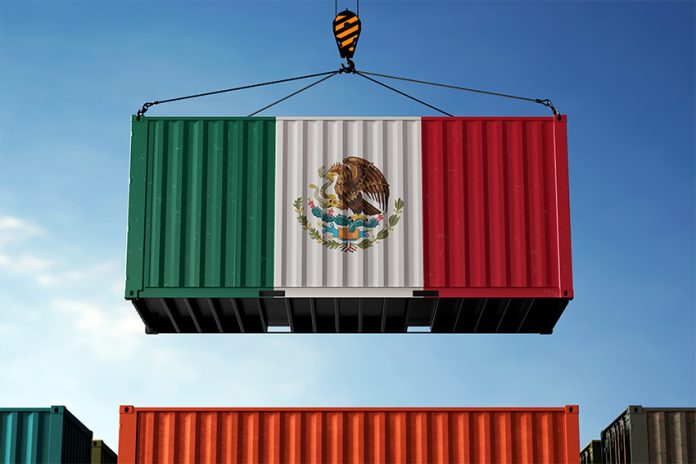Will the federal government’s proposed judicial reform kill or critically harm Mexico’s nearshoring opportunity?
Has Mexico benefited in any meaningful way from what has been described as a “once-in-a-generation opportunity” to attract investment from foreign companies?
These were among the questions considered by business, political, and social leaders who attended the American Society of Mexico’s third Binational Convention in Mexico City this week.
Many other leaders and experts have reflected on the same questions.
Larry Rubin, the president of the American Society of Mexico (AmSoc), said Tuesday that United States companies are holding off on announcing investments in Mexico due to uncertainty created by the government’s judicial reform proposal — which was approved by the Chamber of Deputies on Wednesday — and other constitutional bills President Andrés Manuel López Obrador sent to Congress in February.
He said that some U.S. companies are looking at investing in Texas rather than Mexico.
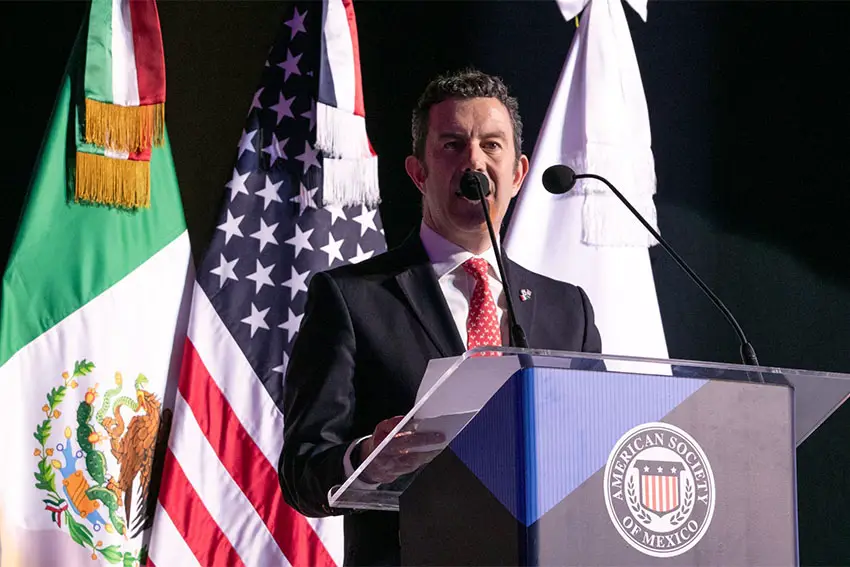
The Lone Star state is seen as an “alternative because uncertainty is one of the main deterrents to investment,” Rubin said.
In Mexico at the moment, he added, there is no certainty that the Mexican justice system won’t be politicized as a result of the ruling Morena party’s plan to allow citizens to directly elect Supreme Court justices and other judges from candidates nominated by the president, the Congress and the judiciary.
Rubin also said that there is no certainty that corruption won’t increase in the justice system, and that judges will have the necessary experience to be “equitable” in their delivery of justice.
He said that “all investors” are “very attentive” to what is happening with the judicial reform.
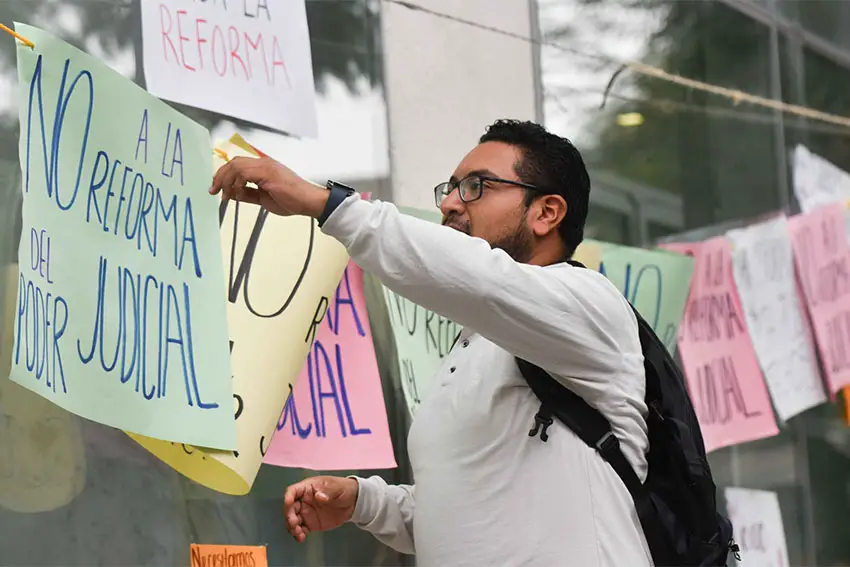
The AmSoc president — a leading representative of the American community in Mexico and an advocate for positive bilateral relations — also expressed concern about the government’s proposal to disband a number of autonomous government agencies, including the National Institute for Transparency, Access to Information and Protection of Personal Data (INAI) and the Energy Regulatory Commission (CRE).
He said that “one of the two presidential campaigns in the United States expressed great concern to us about the impact” of the proposed judicial reform as well as the constitutional bill that seeks to eliminate autonomous agencies.
“It’s essential that any reform of this magnitude be carried out with great care, that it be thoroughly studied, that legislation isn’t made on the fly and that all actors are truly involved [in the process],” Rubin said a day before deputies approved the judicial reform bill in a single marathon session held at a Mexico City sports center because entrances to the Chamber of Deputies were blocked by protesting court workers.
“… That’s why we ask Congress to take into consideration the voice of the most important investment in the country, which is United States investment,” he said.
Rubin said that U.S. investors want to participate in “active discussions” with Mexican decision-makers and help Mexico achieve “a strengthened rule of law for United States companies.”
The United States: Mexico’s main rival for investment?
Rubin said earlier this year that if Mexico “doesn’t offer a competitive framework” for investment, “a lot of investment that could have come to Mexico will remain in the United States.”
He noted that Samsung decided to invest in semiconductor manufacturing in Texas rather than in Mexico.
The federal government announced tax incentives to promote nearshoring last October, but has faced criticism for implementing and pursuing policies seen as unfriendly to foreign investment.
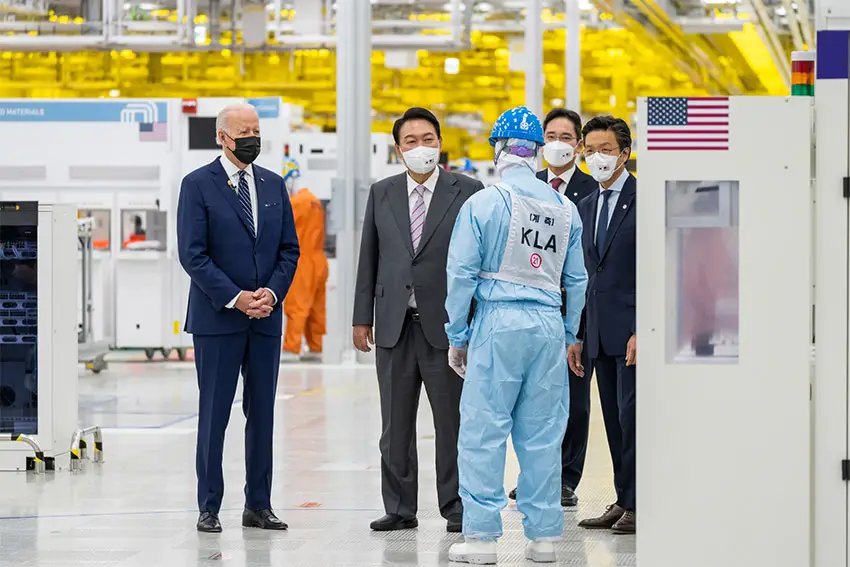
At this week’s AmSoc event, former Mexican ambassador to the United States Gerónimo Gutiérrez Fernández said that Mexico’s main competitor for investment is the U.S.
“Our main competition for investment is not necessarily other developing countries or intermediate economies, but rather the United States, which is promoting an an industrial policy to attract investment,” he said.
NPR reported in April that the Biden administration was “giving Samsung $6.4 billion to help build massive new semiconductor chip plants in central Texas.”
In comparison, Mexico’s incentives can only be described as minuscule.
Judicial reform’s impact on Mexican democracy
In a “commentary” article published on Tuesday, the director of the Americas Program at the Washington D.C.-based Center for Strategic and International Studies expressed concern about the judicial reform and the bill that “could abet the dissolution of independent regulatory bodies.”
Dissolving agencies such as INAI, CRE and the Federal Economic Competition Commission “or folding them into the presidency would not only violate myriad provisions of the United States-Mexico-Canada Agreement (USMCA) but also paralyze key economic sectors in a moment of deep uncertainty,” wrote Ryan C. Berg.
“This would be highly prejudicial to Mexico’s ability to remain a strategic partner in the nearshoring and supply chain security goals of the United States,” he asserted.
“In the worst-case scenario, it could prompt a reconsideration of Mexico’s role in the North American bloc, forcing U.S. policymakers to consider Costa Rica, the Dominican Republic, and Panama as geographically proximate alternatives in Latin America with greater democratic bona fides,” Berg said.

One sector ripe for nearshoring investment in which Mexico and the United States are collaborating is the semiconductors industry.
The U.S. State Department said in March that the U.S.-Mexico chip partnership will “help create a more resilient, secure, and sustainable global semiconductor value chain,” while the CEO of the American Chamber of Commerce of Mexico, Pedro Casas, told Mexico News Daily in July that he was very optimistic about the future of semiconductor manufacturing in Mexico.
However, investment from the United States — home to chip manufacturers such as Intel and Texas Instruments — and other “democratic countries” is at risk from López Obrador’s proposed reforms, according to Berg.
“In a world where capital and investment have an orientation and some worth is attached to political and values alignment, it is not difficult to imagine how AMLO’s reforms could drive away further investment from democratic countries and invite greater investment from autocratic or authoritarian countries,” he wrote.
“China, for instance, is well accustomed to doing business in environments with highly politicized judiciaries and less certain rule of law.”
Are FDI levels as good as they seem?
Mexico received record foreign direct investment totals in 2023 and in the first half of 2024.
However, new investment only accounted for 13% of FDI last year, with 74% of the $36 billion total coming from reinvestment of profits by companies that already operate in Mexico. The new investment percentage in the first six months of 2024 was even lower at just 3%.
At the AmSoc event, the Latin America head of S&P Global Ratings pointed out that new FDI last year accounted for less than 0.3% of Mexico’s GDP.
“The investment of new companies in Mexico is very low in relation to … GDP, … the lowest since 2012,” said María Consuelo Pérez.
Overall FDI as a percentage of GDP also declined to an 11-year low in 2023 at around 2%.
“AMLO’s reforms could further erode investor confidence, damaging the conditions essential for growth in the country,” wrote Wilson Center scholar Diego Marroquín Bitar in a post to X above a Bank of America graph that shows FDI in Mexico as a percentage of the country’s GDP since 2000.
Foreign investment in Mexico as a share of GDP dropped to an 11-year low last year, with the majority coming from reinvested earnings rather than new commitments. AMLO’s reforms could further erode investor confidence, damaging the conditions essential for growth in the country. pic.twitter.com/XQ5BvfdgtD
— Diego Marroquín Bitar (@DiegoTMEC) August 26, 2024
For their part, López Obrador and President-elect Claudia Sheinbaum have rejected assertions that the reform agenda will affect foreign investment.
The latter said in a post to X this week that “the reform to the judicial power doesn’t affect our trade relationships or private national and foreign investment.”
While disappointed about the low levels of new investment in Mexico, Pérez was upbeat about foreign companies’ reinvestment of profits in the country.
“That gives us a sign that companies want to continue being here,” she said.
Still, “the evidence we have” shows that nearshoring to Mexico “has been slow,” the S&P executive said.
Will nearshoring accelerate or fizzle in the years ahead?
The federal Economy Ministry frequently highlights the numerous investment announcements made by foreign and domestic private companies, with current and incoming officials asserting that they are indicative of the good conditions for business in Mexico and confidence in the government.
The announcements could be seen as proof that nearshoring is indeed happening.
Investment announcements exceeded US $100 billion last year, and reached almost $50 billion in the first seven months of 2024.
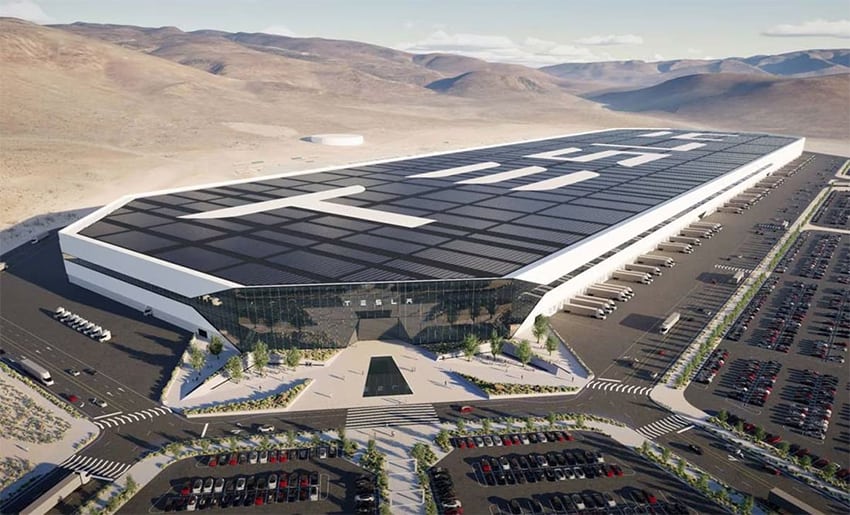
However, announcements are just that — announcements, and no guarantee that the pledged investment will actually happen. Tesla, for example, announced a multi-billion-dollar “gigafactory” plan for Nuevo León in March 2023. However, the project is now “paused” and there is a possibility that it won’t ever eventuate.
If the majority of the investment announcements do become reality, the government, in time, will be able to say that it did indeed seize the nearshoring opportunity. If the opposite turns out to be the case, there will no doubt be much talk about Mexico having squandered a golden opportunity.
Pérez said at this week’s AmSoc event that the government needs to promote the generation of clean energy, address the water crisis and ensure that Mexico has sufficient trained personnel in order to attract foreign companies and capitalize on the nearshoring opportunity.
Other experts have made similar remarks, also pointing out that concerns over security, the rule of law and insufficient infrastructure are barriers to greater foreign investment.
Now the judicial reform — which the Senate could approve as soon as next week — is the biggest concern. It’s also the main factor in the depreciation of the Mexican peso below 20 to the US dollar for the first time since 2022 on Thursday.
In a column published in El Heraldo de México on Thursday, economic journalist Carlos Mota likened the lower house of Congress’ approval of the judicial reform proposal to a final nail in the nearshoring coffin.
“The collection of government blunders to seize the trend, and the approval of the reform to the judicial power, allow us to understand [what will be] the next stage of nearshoring: the farewell,” he wrote.
Can Mexico provide the life support he and other experts suggest that the nearshoring trend needs?
Will nearshoring in Mexico flourish, or will it become a forgotten phenomenon that never really was?
By Mexico News Daily chief staff writer Peter Davies (peter.davies@mexiconewsdaily.com)
With reports from Reforma and Forbes México
